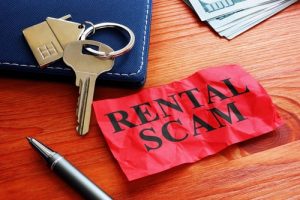A rental scam is a scheme where someone pressures you to sign a lease or give a deposit for a rental that doesn’t exist or isn’t available. By creating a fictitious listing on the internet, thieves may ask you to send a security deposit without actually offering you a lease for the property they represent as “available” for viewing and renting by you or anyone they know. If you’re asked to rent sight unseen, or the rate for a place looks too good to be true, these are signs that you could be getting scammed. Scammers tend to target people who want to rent apartments quickly without paying too high of a price like students or older people who don’t have a lot of money coming in each month since the landlord gets their security before move-in. There are a handful of commonalities seen in fraudulent rental listings. Since many scammers are not legally authorized to take money for non-existent properties with fake addresses or online personas that they cannot easily be found via social media websites or even public records kept by the government.
You may be dealing with a rental scam or dishonest landlord if:
- The landlord asks for the security deposit before you sign the lease
- You see the same property advertised on different websites listed under a different person/company
- The landlord lives out of state and doesn’t have a local management company with whom you can have regular contact
- The landlord does not provide you with their office or home address
- The landlord asks for money up front to help you look for a property
- The landlord doesn’t have an official ‘Rental Application’ form for you to complete
- The landlord does not require that you sign a legally binding lease and does not give you an executed copy
Ways to Avoid Rental Scams:
Thoroughly vet the rental listing: Using the tips above, make sure the rental listing you’re considering looks legitimate. Look for a real address on online ads as well as a cell phone to call a real person instead of a P.O Box or a cell number that doesn’t have a name attached to it by Googling the number first to see where it’s from. Beware of scams that look official but give a landlord’s name as a generic email address that never has responded to your emails – that’s a red flag too!
Meet the landlord in person: You need to meet the person you are renting from. Always check out the actual place before signing the lease; it is possible for a scam artist to create an online ad with the home or property they wanted to show to you but not upload an image of the residence due to fear of being caught. You could also receive a fake lease agreement that looks real at first but in reality doesn’t hold any legal weight that could jeopardize your legal rights.
At the end of the day, it’s always best to work with a real estate agent that can help you find a home and avoid any real estate scams and remember to only work with licensed real estate agents (like those at Lowcountry Real Estate) and lenders that you trust . If you don’t know where to start, you can start by calling a local real estate agent to help you find your dream home in a neighborhood that fits your needs and budget — they can help you avoid any homebuyers or home sellers scams that come your way!
If you suspect you are dealing with a scammer, contact our office and we will help in researching the right property for you.
Info@cir-mo.com | (573)896-1079

